BETTER WORLD



Isaiah 40:31
‘Those who hope in the Lord will renew their strength. They will soar on wings like eagles; they will run and not grow weary, they will walk and not be faint.’
 FROM OUR CEO
FROM OUR CEO





Isaiah 40:31
‘Those who hope in the Lord will renew their strength. They will soar on wings like eagles; they will run and not grow weary, they will walk and not be faint.’
 FROM OUR CEO
FROM OUR CEO

‘Power at its best is love implementing the demands of justice, and justice at its best is power correcting everything that stands against love.’—Dr. Martin Luther King Jr.
You might have seen the 1960 photo of Ruby Bridges, a six-year-old flanked by US Marshalls, walking to school through a throng of protesters who were waving placards like, ‘all I want for Christmas is a clean, white school.’ As the first non-white child to enrol after segregation officially ended, this tiny girl asserted power over an established culture of injustice and discrimination.
Ruby shows that power doesn’t always look the part. But more profoundly, Jesus teaches us what power looks like through his death and resurrection. The cross may have looked like weakness, but Jesus gave his life willingly and his resurrection demonstrated the full power of the creator of the universe. When Jesus calls us to take up our cross and follow him, that means following his example of
loving our neighbours (including our global neighbours), and at times, willingly relinquishing our own power so others can flourish.
We’re dedicating this issue of Better World Magazine to exploring power, and how it functions in our world. You can learn more on page 10 about the way communities in disaster-prone regions gain power by preparing for disasters before they strike. And on page 12, we share the inspiring example of Mi Kai (pictured left with her family) and her church’s advocacy work for persecuted minority groups in Myanmar
Also, please celebrate with us as this year marks 50 years of Child Sponsorship! Kennedy, a former Child Partner, now Board vicepresident with our Ugandan Partner, shares how Child Sponsorship is now better than ever (page 6). And you won’t want to miss our Curly Question as Graeme Anderson of Northside Baptist helps us better understand the role power plays in our lives (page 14). Finally, our devotional on page 15 reminds us that God sees all of us as equal, no matter our age, gender, or socio-economic power.
Little Ruby, with support, did gain an education and grew up to become a powerful advocate for justice and change. Today she runs her own foundation empowering young people with the skills and knowledge they need to continue fighting discrimination and injustice.
When we become aware of the ways power has been distributed unequally, we become advocates for others—making space for those who’ve traditionally been disempowered to experience the fullness of life God intends.
Because of Jesus,
LEBANON
3,000
PEOPLE IN TÜRKIYE have received mental health support through our Partners after the earthquake.


Being stateless and without citizenship is an injustice that robs people of their future.
Sara lives in Lebanon with her husband, Salim, and their three children. She’s stateless, so she has limited access to gainful employment, healthcare, and humanitarian assistance. Soaring rent and poverty forced the family to move into a conflictridden neighbourhood where her kids would spend their days at home or on the streets, as school was unaffordable.
Thankfully, Sara’s family lives in the community where our local Christian Partner serves. Since meeting our Partner, her children have been enrolled in our Partner’s education centre, where they’re thriving in their learning and enjoying time with their classmates.
Our Partner also supports the family with accessing food and household essentials. Recently Salim’s tuk tuk broke down, and they
provided him with new batteries so he could continue to support the family as a delivery driver. And when Sara was diagnosed with cancer, our Partner covered her emergency care expenses, and helped her secure funding for radiotherapy and chemotherapy.
Now she’s in good health, Sara is taking steps towards providing a better life for her children.
Currently she’s working with our Partner’s legal aid team to obtain identification papers. ‘I have strong faith in God,’ she said. ‘I’m deeply thankful to everyone supporting us.’
Very few children in the marginalised Netuwa community in Nepal regularly attend school, making it difficult for them to build a future without poverty. Our Partner has been meeting with a group of parents in the community and talking to them about the value of education. In a recent meeting, they found 85 per cent of these parents are now sending their sons and daughters to school regularly.
In a northern village in Cambodia, residents wanted to build a stable bridge so children could go to school safely during the rainy season. Supported by our Partner, community volunteers organised for each household to contribute one person to build the bridge (pictured below). ‘This bridge might not look like much,’ said a community member, ‘but the impact is big for our village!’.

To combat food insecurity amidst conflict in Ukraine, Our Partners helped local churches provide regular hot meals to 1,564 vulnerable families in Poltava and Odesa. Volunteers cook and serve the meals from mobile kitchens and collection centres. ‘All the produce is fresh and tasty,’ one recipient said. ‘We have a full range—milk, fish, chicken, sauerkraut, buns and much more!’
One person donating $1 A DAY can help 3 children attend our Partner’s Education Centre in Lebanon for a year.
MALAWI
Community development is about locals working together to solve problems. Over the past year, our Partner in Malawi has seen community members increasingly take ownership of their projects. Youth now manage natural resource initiatives like planting seedlings and maintaining tree nurseries; residents are promoting hygiene and sanitation in marketplaces; and one community group used their resources to build classrooms for a local primary school.
‘What makes us persevere is our faith in the word of the Lord, that he is our shepherd, and he cares for us through his church.’
—EARTHQUAKE SURVIVOR IN SYRIA
KENYA
To help families survive ongoing drought in Kenya, our Partner provided 17,806 people in the Makueni, Kitui and Garissa counties with staples such as rice, maize, and nutrient-rich porridge. Supplemented with local vegetables, these supplies mean people can redirect the time they spent searching for food into income-generating activities, such as reviving their farms and looking after livestock.
2,179
PEOPLE IN TONGA have improved food security after building greenhouses with support from our Partner.
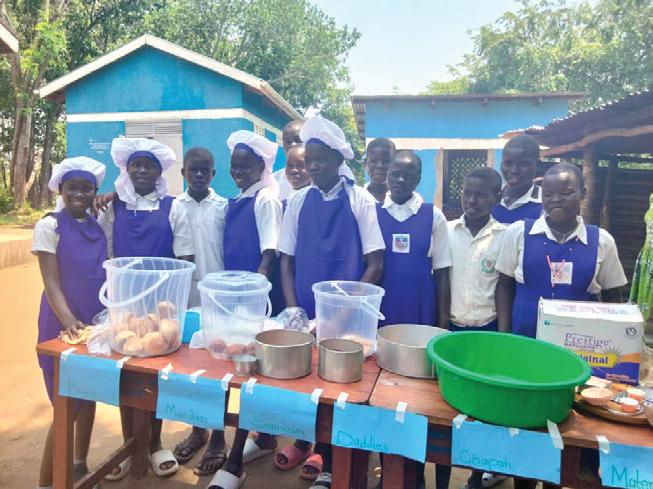
UGANDA
Our Partner in Uganda works in a region where most families struggle to keep their children in school. Recently 30 students joined a bakery club funded by our Partner, and a few months later, they were selling bread in local markets, making as much as $150 in one day! The money is shared between the group members, which they use to buy more ingredients for baking.
As part of Micah Australia, Baptist World Aid was thrilled to bring four delegates from Australia and Papua New Guinea to the annual Pacific and Australian Emerging Leaders’ Summit in late November. We joined 70 young leaders for seven days of dialogue, training and lobbying in Canberra mostly around the issue of climate change, and the devastating effect it continues to have on this region.
◀ Give a gift that gives twice! Better World Gifts help mothers survive childbirth, provide clean water and shelter, result in food for families, and so much more. bwaa.co/gift-hope
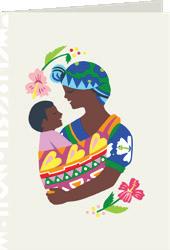


On a visit to India, Baptist World Aid’s first CEO, Rev. Alan Prior, was moved when he discovered a community of children—who had been orphaned— being cared for by already over-stretched families from the local Baptist church.
Soon, Baptist World Aid began supporting these children with housing and education. Pressure was building from generous Australian Baptists who longed to help the world’s most vulnerable, so the first Baptist World Aid Child Sponsorship program—Support an Orphan (SAO)—began in 1974. And when Sponsors enthusiastically signed up, thousands of children received shelter, food and education that changed their lives.
‘If young people have opportunities to be involved in activities leading change, they grow up knowing they don’t have to accept the way things are.’
—REBEKAH COCHRANE, INTERNATIONAL PROGRAMS MANAGER, CHILDREN AND YOUTHThis year, we celebrate all God has done through our first 50 years of Child Sponsorship.
In Uganda, Kennedy was one of the first children to be sponsored. When asked if Child Sponsorship changed his life, he replied without hesitation. ‘Absolutely. Fundamentally. I was the youngest of eight children of a single mother. We were barely surviving.’
Kennedy remembers playing fun games, learning how to work with his hands, and developing other skills that set him up for life. But more than anything, he recalls a safe and caring environment.
‘The food provided was unlike what we’d have at home. We’d have milk, cake, and meat. We realised that these guys are not only paying school fees, they’re also interested in us being healthy.’
Kennedy went on to gain two master’s degrees and is now working on a Doctorate of Ministry. He works for a theological seminary and is Vice-President of the Board of SAO Uganda. Kennedy has seen the Child Sponsorship program evolve from a Baptist World Aid-led project to Share An Opportunity—a Ugandan run,
independent entity. And like many sponsorship programs around the world, their emphasis has moved away from individual child welfare.
‘Our approach now says, “We can help communities to care for their children,”’ Kennedy said. ‘So rather than helping one or two children from a family of 12, now you’re empowering the family, economically and socially, to care for their own.’
These days, Baptist World Aid works in partnership with SAO Uganda and other organisations around the world to run Child and Youth programs, available to all children and young people in the community. In many ways, it’s just as Kennedy remembers—children enjoying food, fun and friendship, along with educational support and initiatives that help children stay safe and healthy.
But there are important additions to today’s programs. Sponsorship now means parents and siblings benefit alongside individual Child Partners, reducing inequity and supporting parents rather than disempowering them by subsuming some of their responsibilities.
Most importantly, rather than view children as victims of poverty, we see active and effective community change makers. Our programs help children speak up for their rights, identify challenges and propose solutions, and take up age-appropriate leadership roles. The result is confident young adults who have the power to lead their community.
As a Christian organisation, we’ve always asserted the indisputable value and dignity of all children. But over the last 50 years, we’ve also learned that young people can transform their communities. With these young leaders emerging, and generous supporters investing in our Partner’s programs, just imagine what God can do over the next 50.
Baptist World Aid has been elevating child rights since 1974. Become a Sponsor and support a child so they can lead their community into the future. bwaa.co/sponsor-today ▶
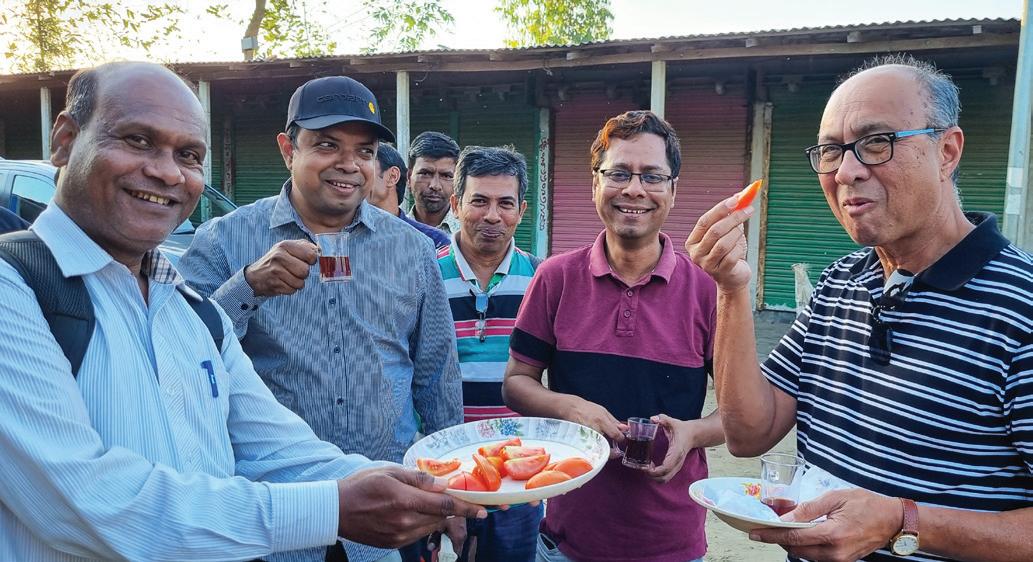
▲ Bangladesh: Baptist World Aid board member, Peter (far right), enjoys fresh tomatoes grown by local farmers supported by our Partners.
▼ Malawi: 27-year-old Pricilla is a vice chairperson of her Youth Club. She is the youngest female leader in her community to be elected to this role at a district level!


▲ Indonesia: our Partner recently helped provide food packages to 8,146 people who couldn’t access social services during and after COVID.

▼ Cambodia: Partner staff member, Channalen, explains to children in a Child Club that they need to give permission before their photos are taken or shared.

◀ Thailand: Baptist World Aid staff member, Bethany, and Uganda Partner, Stella, gathered with Child and Youth programs staff from around the world in Bangkok for professional development and relationship building.
▼ Uganda: Vicky demonstrates to Jimmy, our Partner’s health and nutrition officer, the Tippy Tap (handwashing station) she made after taking part in training.

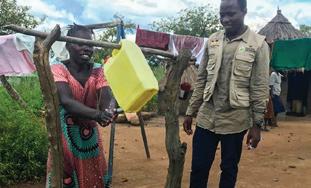

▲ Vanuatu: Pastor Kalo from Vanuatu Baptist Church (left) and Partner staff, Roshan, at a shelter project following tropical cyclones last year.

Out of the 1.5 billion people at risk of being impacted by floods, 89 per cent are from low and middleincome countries.
Whenever the rain started in Subhuja’s village, she’d stay inside her house terrified—frozen in fear at the thought of a catastrophic flood. The 15-year-old lives in one of the most disaster-affected districts of Bangladesh where tropical cyclones, storm surges, and flash floods are common.
Subhuja is not alone. Out of the 1.5 billion people at risk of being impacted by floods, 89 per cent are from low and middle-income countries, where poverty is likely to increase vulnerability.
Floods obviously spare no one in their path, but those with boats stand a better chance of survival. Evacuation to higher ground favours the able-bodied and healthy. And if you’ve managed to build your house on stilts and stockpile emergency food, you’ve some hope
of holding on to your home, your livelihood, and your life during seasonal flooding.
Immediate aid responses to disasters are often swift and generous, but the sustained work of helping communities prepare for disasters can take a backseat. Ensuring all people can prepare for disaster is an act of justice. When access to resources is limited, then it’s the most vulnerable who disproportionately bear the impacts when disaster strikes.
The COVID pandemic starkly demonstrated this truth, reversing two decades of development gains within months of its onset in vulnerable communities. Similar vulnerabilities persist in the face of natural hazards and environmental crises, and threaten to undermine the goal of eradicating poverty by 2030.
‘Poverty undermines preparedness,’ said Kelsea Clingeleffer, Disaster Management Coordinator at Baptist World Aid, ‘and a lack of preparedness perpetuates poverty. Interrupting this cycle from both sides is critical to putting power in the hands of disaster-prone communities.’
Poverty constructs numerous barriers to disaster preparedness. Insecure housing, inadequate infrastructure, and limited access to essential health, sanitation and communication services heighten vulnerability and risk.
But while poverty exacerbates the damage a disaster causes, the inverse is also true.
Preparedness can help reduce vulnerability, which in turn can reduce poverty in communities. To prepare for disasters such as drought, our Partners in Kenya help communities build water infrastructure, plant drought resistant crops, and line rivers with new trees to prevent erosion of the riverbanks. They also facilitate information sharing sessions so communities, including children and young people, can learn about the risks in their communities and work together to mitigate them.
For this reason, community development programs are themselves a form of disaster preparation. When our Partners help people diversify their livelihoods, family incomes are protected in a crisis. By increasing the financial sustainability of a family through education, business development and savings, their housing and access to health care improves, and so does their resilience after a disaster.
Before joining our Partner’s Child and Youth project, Subhuja had little understanding of natural disasters and how to respond to them.
Now, along with other young volunteers, she’s received training in cyclone preparedness, fire safety, and first aid. As members of the Community Emergency Response Team, the youth in her community monitor disaster threats and respond, in ageappropriate ways, when disaster strikes.
‘Previously, I was scared of cyclones, floods and other disasters,’ Subhuja said. ‘But now, when
it rains or there is risk of floods, I come out from my house not only to save my family and belongings, but also to save my neighbours and members of the community. I never thought that I would ever carry out such brave work. I did not have such courage. It was only after I underwent training and became a volunteer.’
Our Partner is supporting many locally-led groups in Subhuja’s community that work together to strengthen livelihoods, promote child rights and education, and develop local infrastructure—alongside disaster preparation.
Ensuring all people can prepare for disaster is an act of justice.
As our world grapples with escalating threats, building resilience through education, infrastructure, and preparedness emerges as a potent tool against the injustice of poverty, safeguarding both present and future generations.

WANT TO HELP COMMUNITIES PREPARE FOR DISASTER?
Your gift to the Disaster Action Fund helps vulnerable communities prepare for disasters, build their resilience, and access life-saving help when a disaster strikes. bwaa.co/DAF ▶

‘At Converge, we were heard by the government. That’s meaningful and powerful.’
—MI KAI LAGWI
As Mi Kai Lagwi watches her boys grow up, she fondly remembers her childhood in Myanmar: playing with friends, family dinners, vibrant community festivals.
She remembers darker things too. Facing discrimination at school, government restrictions on her church, pastors being arrested for speaking about human rights, the rising tide of political unrest swirling around her.
Mi Kai is proud to be Kachin—one of Myanmar’s ethnic groups living near the border with China. For over 70 years, communities like the Kachin have been caught up in conflict between the military and armed independence groups. Many civilians have faced oppression, from restrictions on freedom of religion, to forced labour and deadly airstrikes on villages.
Mi Kai and her family were forced to flee to Malaysia in 2007, and five years later, they were granted refugee status in Australia. Mi Kai was eighteen when the family moved to Wagga Wagga, where she finished school and went on to study law at university. Mi Kai was building a new life, but she never forgot the injustices she experienced in Myanmar.
‘My parents talked about unfair treatment from the military government, how people are oppressed but the Bible says that God treats us as equals,’ Mi Kai said. ‘Being a Kachin Christian, I’ve experienced oppression and discrimination. I feel like it’s my responsibility to raise awareness in Australia about what’s happening.’
Today Mi Kai lives in Melbourne with her husband and their two sons. For the
last decade, she’s been taking part in peaceful protests against injustices in Myanmar.
Her church, Kachin Baptist Church in Footscray, is also advocating for change. Australia’s Myanmar community includes around 10,000 Baptist Christians. Right now, their main concern is for their loved ones’ safety. In February 2021, a military coup renewed intense conflict, sparking violence across the country. Up to 1.95 million people have fled their homes; in Kachin state alone, over 116,000 people are living in informal settlements.
‘My relatives can’t work. There’s bombing and shooting around them, and my cousins can’t go to school,’ Mi Kai said. ‘We have church members whose relatives have been arrested, one youth whose relatives were killed during an airstrike, others whose relatives have become internally displaced. I feel very sad and hopeless.’
Along with praying fervently, Mi Kai’s church raises money for displaced people in Myanmar. They’re also using their collective voice to urge our Government to act. In October 2023, Mi Kai represented her church at Converge, a gathering of Baptist representatives, including Baptist World Aid, that lobbies the Australian Government on matters of justice.
Mi Kai shared her story with Members of Parliament in Canberra as part of a larger campaign lobbying for economic sanctions aimed at the military in Myanmar. As a young mum studying law while juggling family life, Mi Kai loved how the campaign pushed her out of her comfort zone. ‘In the past when I protested outside the embassy, my voice wasn’t always heard. At Converge, we were heard by the government. That’s meaningful and powerful,’ she said.
The campaign (along with lobbying from many other advocacy groups) was also effective. Four months after Converge, the Australian Government announced new sanctions on the financial institutions that fund Myanmar ’s military junta.
Mi Kai doesn’t always feel influential; she simply wants to use the opportunities God gives her. But she knows that when united, voices have power.
‘Now I want to get better at advocating for people, so I’ve been training myself and learning how to be a better speaker,’ Mi Kai said. ‘Together we’ll continue to do this work, until there is justice for Myanmar.’

1
Speak out. Use your voice to speak out against injustices happening in Australia and around the world. You can call for action by writing a letter to your local MP or signing a petition that aligns with your cause.
2
Spend ethically. Consider where you buy clothes, or how you choose your super fund. Profit drives most business decisions, so investing in companies that promote ethical practices, and care for people and the environment, is an important way to use your power for good.
3
Volunteer. Use your time to volunteer for a cause you care about. Many organisations fighting injustice rely on the work of volunteers, so you can play a part in creating real change.
4
Vote wisely. We have the power to influence government policy and action when we vote. Be informed and use the power of your vote to stand up for people experiencing injustice.
5
Start a conversation. This may feel small, but starting conversations with your family, friends, or church spotlights issues of injustice and helps motivate others. Discuss how, individually and collectively, we can work towards a better world.


You might remember the first time it happened.
You’re arguing with a sibling about a piece of cake. You want a bigger piece, which will mean she gets less. But if she gets a bigger piece, you end up with less. That will simply not do. You both reach for the knife at the same time because the person with the knife has the power. It’s at that moment your parent steps in, points to you and says, ‘you cut it.’ Then points to your sibling and says, ‘you get first choice.’
You were competitors for a limited piece of cake, but you’ve now formed a collaborative allegiance with a common strategy that ideally means neither of you will be worse off (unless of course your sister turns out to be quicker and stronger than you, in which case just give her the cake and be done with it).
Our economic system seems most often approached like a piece of cake where the only way for me to have
more is for you to have less—it revolves solely around the idea of ‘winners’ and ‘losers.’ This then shapes our political, educational, and therefore social system.
We regularly endeavour to engage in conversations shaped by ‘piece of cake’ theory. This results in a system steeped in fear and lack. The fear that if ‘they’ get more (money, influence, or power) then ‘we’ consequently get less.
I wonder if the way we choose to give is often shaped by this approach. The result is that the way we give becomes carefully (though unintentionally) designed to ensure that we remain the ‘winners.’ Money is given with strings attached. Just enough is given to help ‘them’ (those living in poverty) get by while ensuring I stay ahead.
It makes sense—I want to act justly without adversely affecting my piece of cake. Acts of ‘justice’ are then outsourced to a carefully managed line in the home or church budget.
How did we get here? It seems it’s a piece of cake. When our confidence is placed in possessions or places of power, we’ll always experience fear and lack. For example, last year I was told a church plant was taking place about a kilometre from the church I serve. My immediate reaction was one of fear. The only way for ‘them’ to grow is for ‘us’ to diminish. I must therefore protect my market share. It’s a lie, sure, but that’s the system I’m shaped by and willingly adhere to. What systemic lies might you be listening to in your home, place of work, or church?
‘When our confidence is placed in possessions or places of power, we’ll always experience fear and lack.’
—GRAEME ANDERSON
In his Sermon on the Mount, Jesus invites us towards a Kingdom-shaped experience of cake. Rather than placing confidence in possessions or power—which will result in a sense of lack and constant fear of being a ‘loser’—Jesus invites us to place our confidence in the Kingdom of God, the realm over which God is in total and eternal control. We learn from the birds and flowers that God’s Kingdom is a place of abundant grace and mercy-filled love. It’s a kingdom where, for example, I can confidently invite all the pastors in my local area to come together and pray God’s rich blessing over the new church plant. What might that confidence look like in your world?
Imagine a world where instead of those in power condescending to give crumbs of cake to those with less, we partner with ‘them’: learning what it looks like to place our confidence in the Kingdom of God, listening carefully to different stories of justice, working together towards a better world for all. A world where we’re no longer competitors (‘winners’ sharing their spoils with the ‘losers’) but co-creators following Jesus, being shaped by his approach to power and joining in.
Graeme Anderson serves as the senior pastor for Northside Baptist Church. He is the author of Follow: Experiencing Life With Jesus.
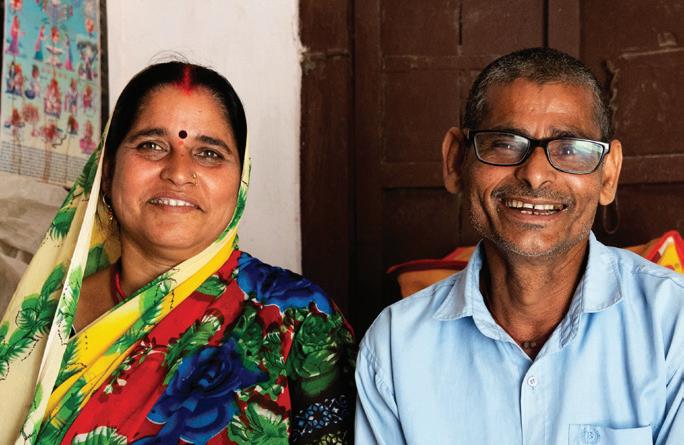
DEVOTIONAL
‘God created mankind in his own image, in the image of God he created them; male and female he created them.’ (Genesis 1:27)
Much of our world is hostile to women and girls, seeing them as second-class citizens with little or no value beyond child rearing, domestic servitude, and physical labour.
But when women and girls can’t participate economically or in decision making, it’s not just they who suffer. Their families suffer, their communities and nations are restricted in their social and economic progress, and the world is a lesser place.
It’s important then, that we understand what the Bible has to say about women, and about men and women together.
God’s first word about women completely shatters the notion that boys are more valuable than girls. He gives both the same identity, and in Genesis 1:28, the same responsibilities by entrusting his creation to them both.
◀ SCAN HERE TO READ MORE OF ‘UNITED’, A DEVOTIONAL ON GODLY PARTNERSHIPS THROUGHOUT THE BIBLE OR VISIT BWAA.CO/EQUALLY-MADE-VALUABLE